How disaster relief has adapted to two horrors: Wildfires and coronavirus
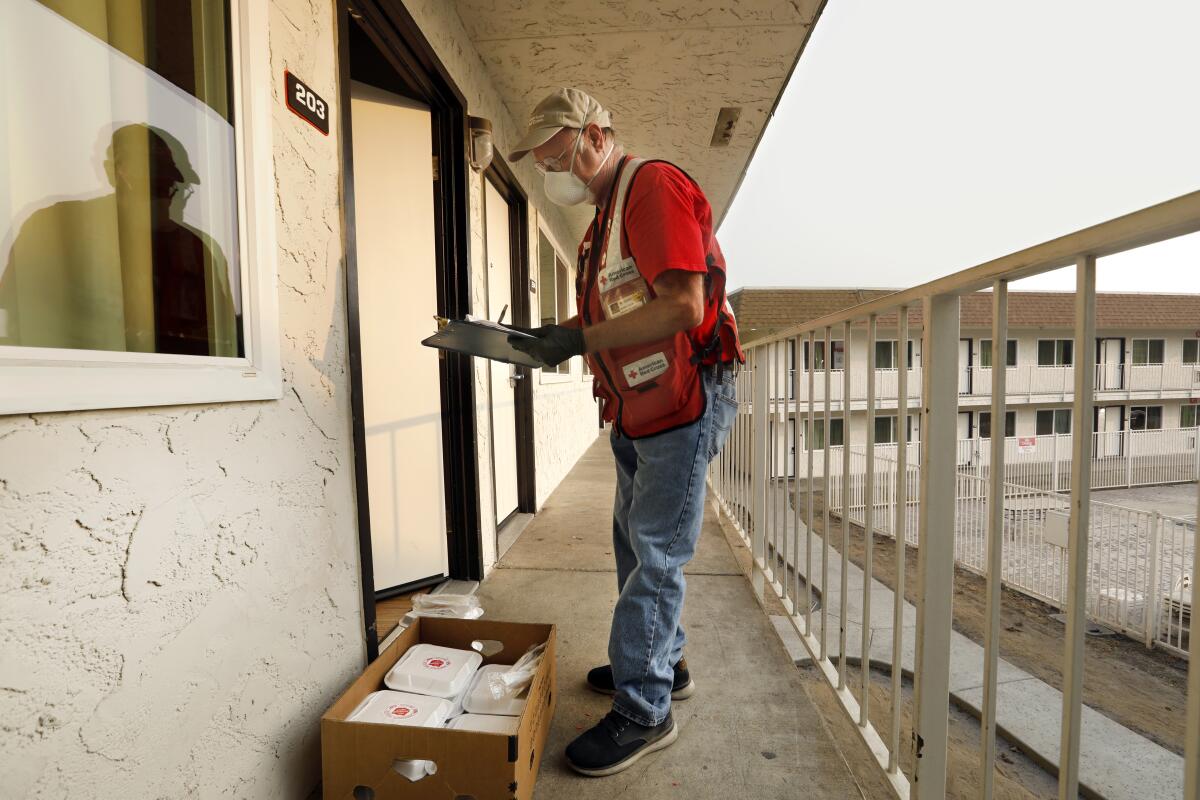
- Share via
OROVILLE, Calif. — James Wood checks his clipboard and bangs on the door at a Motel 6. The air is thick with smoke.
“Red Cross,” he calls, loudly, through his heavy, protective mask. “Dinner!”
His gloved-and-masked partner places four white foam boxes on the ground. They are filled with chicken tacos, compliments of the Salvation Army. The motel door swings wide. A head pops out. There are thank yous and the murmur of comforting conversation. Then the refugee from the North Complex fire picks up the food, shuts the door, and the volunteers move on to the next room. And the next one. And the next.
This is how emergency services are provided in the fall of 2020 at the intersection of twin horrors — natural disasters of record proportions and a global pandemic. There are no longer massive shelters in California where the coronavirus could spread among traumatized people running for their lives; the state prohibits large gatherings. That means no dining halls. No in-person counseling, no hugs, no tissues to dry tears.
As wildfires rage in the West and hurricanes pummel the Gulf Coast, disaster aid has been forced to evolve, for better or for worse. When large-scale disasters strike in states with looser restrictions than California’s, the Red Cross has instituted coronavirus precautions in group shelters: health screenings, mandatory face coverings, staggered meal times, extra space between cots and tables.
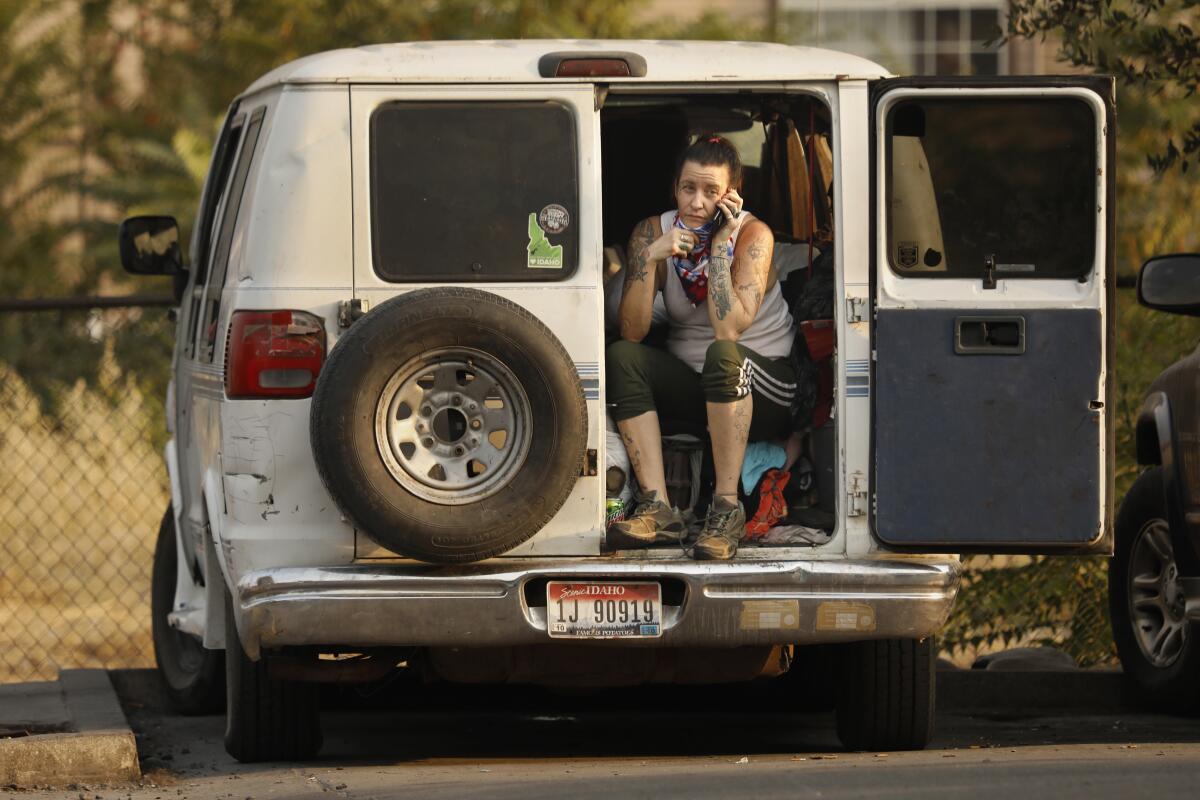
In Butte County — where the North Complex fire rages and the per capita coronavirus rate is 33% higher than Los Angeles County’s — evacuees are being housed in motel rooms, not fairgrounds or school gymnasiums.
Yes, this means there are beds and private bathrooms instead of cots and shared facilities. But Butte County is a rural area. There aren’t a lot of options. And when the North Complex fire bore down on this thickly forested, mountainous region 70 miles north of Sacramento, many motel rooms had already been commandeered for people fleeing wildfires in neighboring counties.
“We don’t have 45 hotels to choose from, and we fill up quick,” said Shelby Boston, who heads the Butte County Department of Employment and Social Services. “We’ve had to shelter survivors of this fire into Roseville and Sacramento. We’ve driven people there…. The folks we’ve had to deliver to a hotel outside of the community, we’ll bring them back.”
The novel coronavirus “has thrown a wrench into the well-oiled machines of congregate sheltering,” she said, upending disaster systems honed here over years of worsening fire seasons and a major dam that threatened to burst in 2017, forcing more than 180,000 frightened people to evacuate. “We’ve had to make adjustments as we go. Adapt and overcome.”
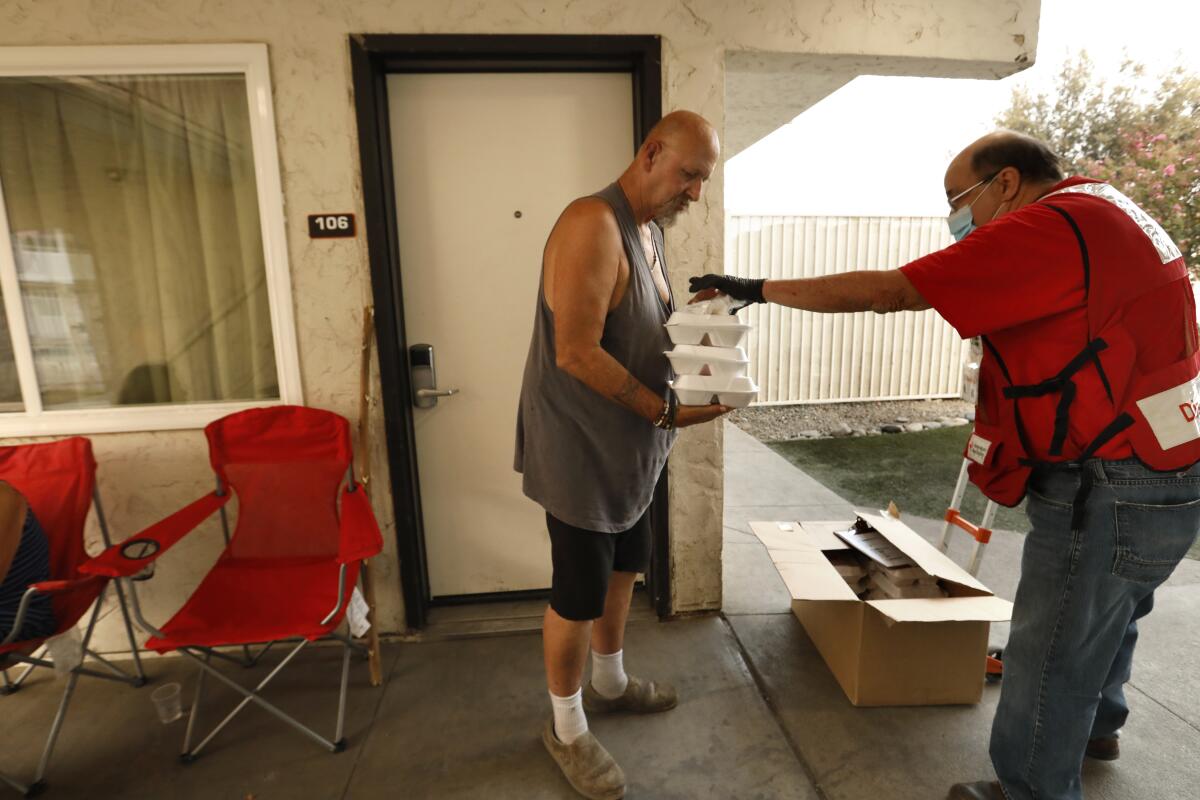
It’s hard to find anyone in this part of Butte County who hasn’t been touched by fire in recent years. Boston calls herself a survivor of the 2018 Camp fire, which razed the small city of Paradise and killed 85 people. Boston’s house survived, she said, but “we lost everything around it. It’s not easy to live in a community that’s been completely destroyed by fire.”
The Camp fire provided a cautionary tale for emergency service providers. Eight of the nine group shelters operating between Butte and Glenn counties during that disaster had serious outbreaks of norovirus. The highly contagious intestinal malady causes diarrhea and vomiting.
A quarter of all evacuees served came down with the bug, according to the federal Centers for Disease Control and Prevention; so did 12 staff members. Twenty-one patients had to be evaluated in a hospital or urgent care facility, but no one died. COVID-19 is a far more lethal disease.
By Wednesday evening, the North Complex fire had burned 273,335 acres and was 36% contained. Red Cross spokesman Justin Kern said more than 1,000 evacuees are being provided with emergency shelter by his organization or the state because that group of conflagrations.
“This pandemic has added layers of complexity to what we do,” Kern said. “This is the health and safety of our workforce, as well as the people we serve. It’s important we take the extra steps.”
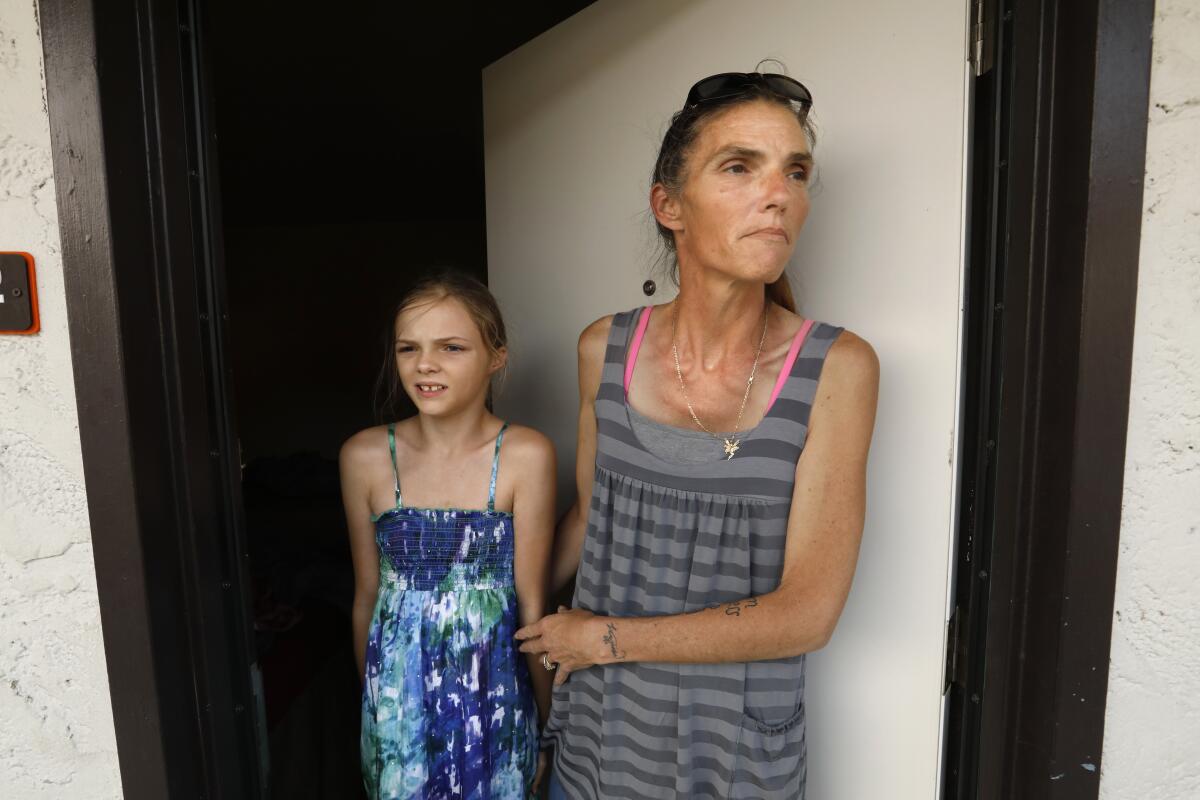
Lea Bickford is staying at the Motel 6 with her children — Jessie, 12, and Madelynn, 11 — and their two chihuahuas, Sugar and Mary. The small family is grateful for new coronavirus protections for reasons of both physical and mental health.
After they were evacuated from their home in the tiny enclave of Rackerby, southeast of Oroville and a fraction of the size, they slept for two nights in their car. Emergency services had lost their paperwork. Madelynn is on the autism spectrum. All the little girl wanted to do was bolt from the vehicle.
In a group shelter, with dozens of people arrayed on cots, “my son would have done OK,” Bickford said, “my daughter not so much. She doesn’t understand what’s going on…. She’d have just run. She’s a runner.”
And Bickford fears the coronavirus because of her own health problems. She has congestive heart failure. Her heart works at about 30% capacity. If she contracted the virus, her doctor told her, “I’d probably not survive.”
She is grateful for the motel room and the four boxes of hot food that arrived in time for dinner. So grateful, she said, that she’s been cleaning the room herself. “They’d do it for me,” she said with a shy smile. “But I can take out my own trash. I’m a grown-up.”
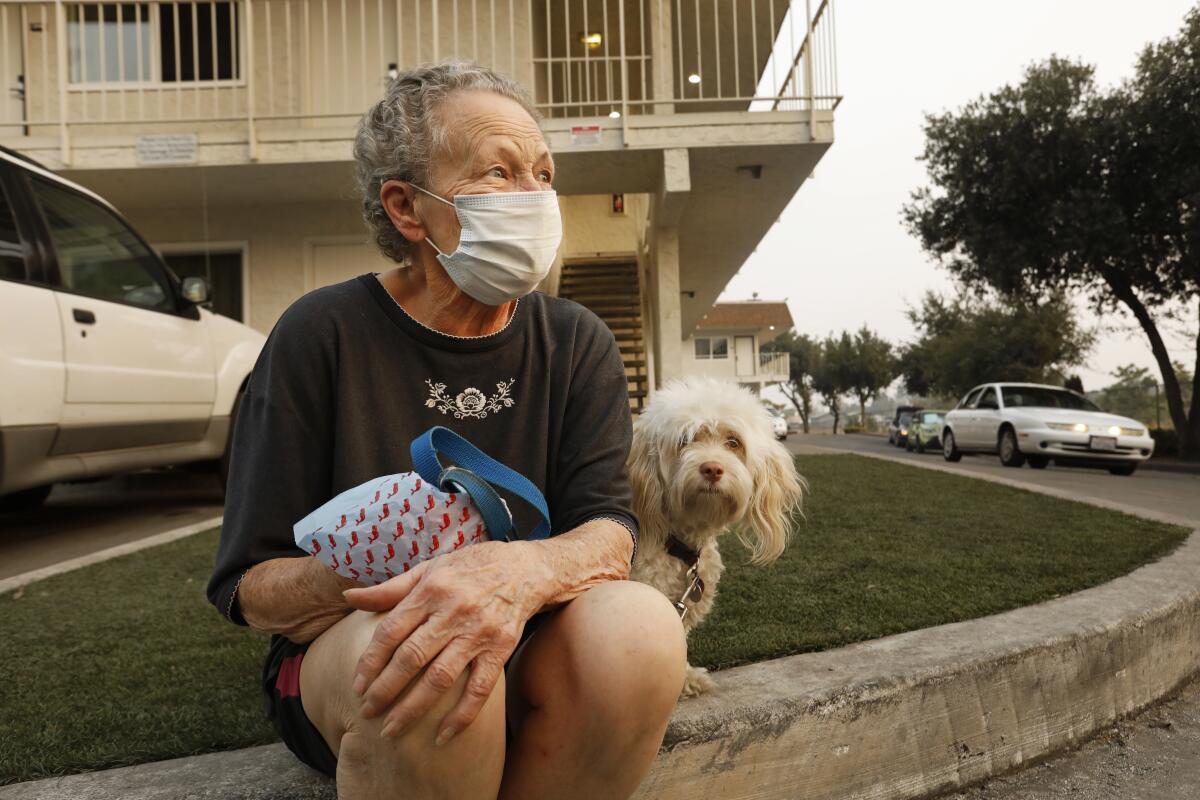
On Tuesday evening, the low-slung stucco motel hard by Highway 70 was quiet. Wood had not yet arrived with dinner. Patricia Baker, 82, was out walking Rascal, her companion dog with fluffy Shih Tzu hair and stumpy dachshund legs.
Baker was the rare motel guest wearing a mask. She hasn’t had the flu in 50 years, she said. She takes blood pressure medication and has a bum hip, but said, “I’m very healthy.” Except she left her medication behind when she fled her Berry Creek home as the fire approached.
Her son was driving their Honda and had the keys to their Chevy Blazer in his pocket. Baker and Rascal hitched a ride down the mountain from a truck driver — a complete stranger — who happened to drive by in the nick of time.
The mask is for the rest of us, not for her, she said, after listing her daily regimen of the vitamins that keep her her spry: B12, B3, C, fish oil.
She’s not worried about falling to COVID-19, she said, “but I don’t want to be the person who gives it to you.”
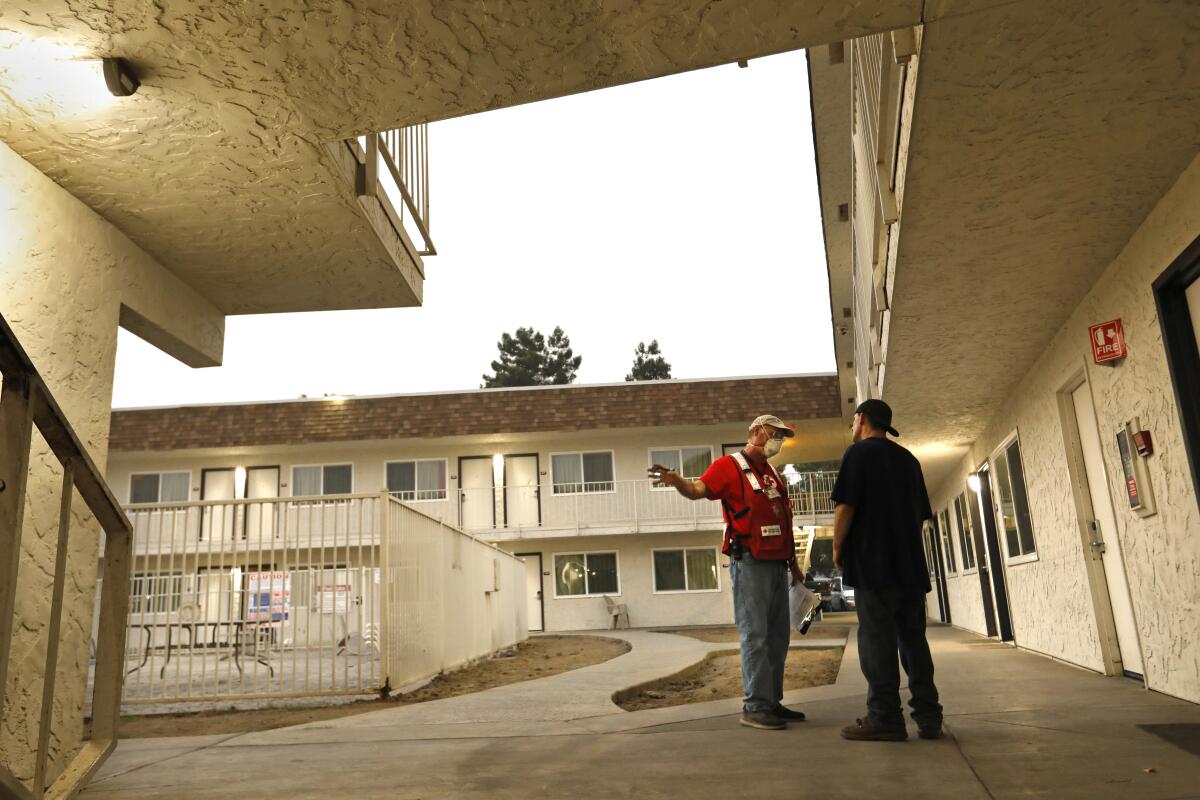
More to Read
Sign up for Essential California
The most important California stories and recommendations in your inbox every morning.
You may occasionally receive promotional content from the Los Angeles Times.











